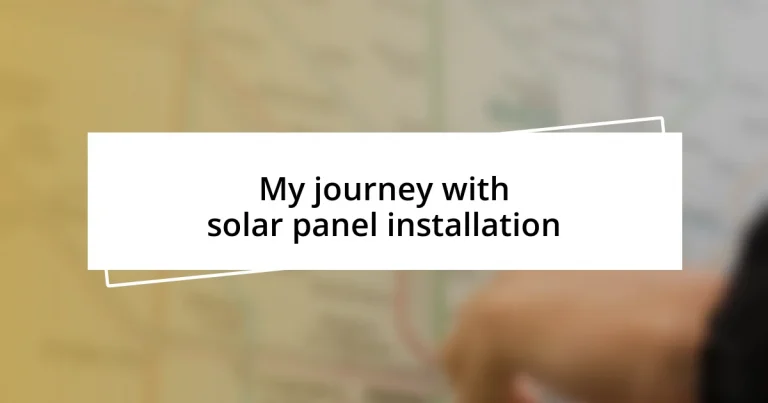Key takeaways:
- Conducting a thorough energy audit and creating a research checklist helped in selecting the right solar panel options and installer.
- Choosing an installer based on experience, community involvement, and warranties ensured a reliable and effective solar installation process.
- Regular maintenance, including cleaning panels and checking inverters, is crucial for maximizing solar efficiency and prolonging system longevity.
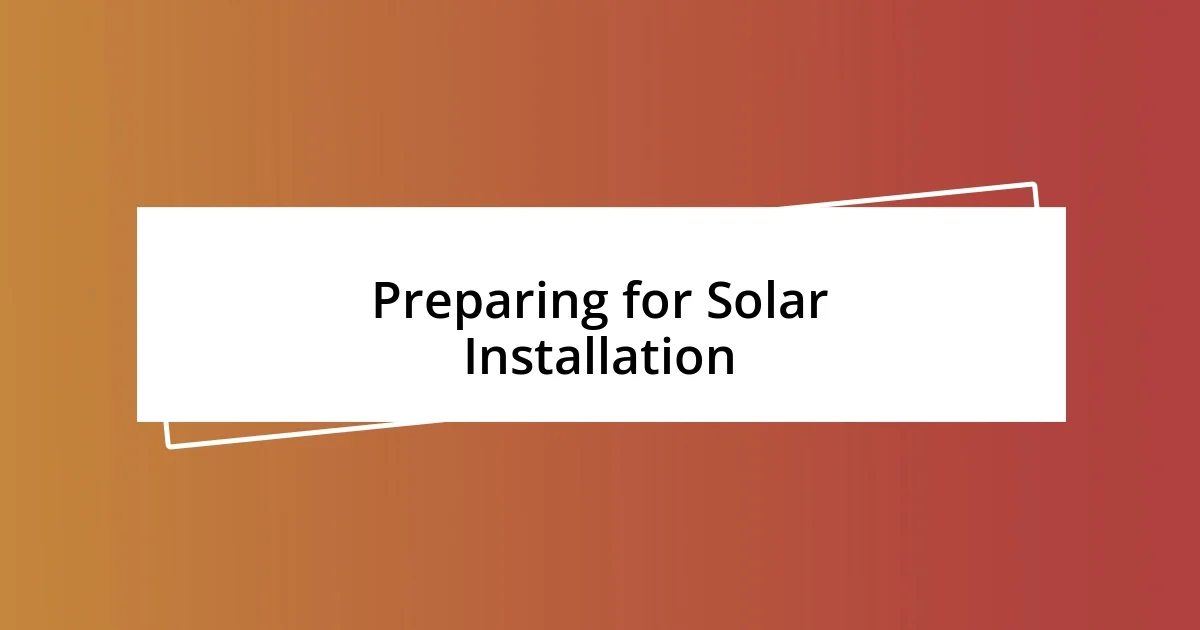
Preparing for Solar Installation
Preparing for solar installation feels like stepping into a new chapter of homeownership. I remember the mix of excitement and apprehension I felt as I gathered information about different systems and sizes for my home. Have you ever stared at a roof and wondered how much sunlight it actually gets? That was me too, diving into online resources and speaking with neighbors who had made the switch.
One of the most crucial steps was conducting a thorough energy audit. I took the time to review my electricity bills from the past year, which provided a clear picture of my energy consumption patterns. It was eye-opening—realizing how much power I used and where I could potentially cut back. This knowledge not only helped me choose the right solar panel capacity but also gave me a deeper appreciation for energy efficiency.
As I finalized my plans, choosing the right installer felt a bit daunting. I asked friends for recommendations and looked up reviews, but what really helped was attending a local seminar where I connected with experts and other solar enthusiasts. Their insights gave me confidence and sparked my curiosity—could this really help me save money and reduce my carbon footprint? Seeing the passion in their discussions made the path ahead clearer and energized my decision-making process.

Researching Solar Panel Options
When I began researching solar panel options, I was pleasantly surprised by the variety available. It felt like opening a treasure chest of possibilities. I found myself diving into specifications—wattage, efficiency ratings, and types of panels like monocrystalline versus polycrystalline. Each bit of information was like a puzzle piece, fitting together to reveal what would work best for my home. It’s amazing how much a bit of homework can empower your choices!
To help narrow down my options, I created a checklist that guided my research:
- Panel Type: Monocrystalline or polycrystalline—what’s the difference?
- Efficiency Ratings: How much sunlight is converted to electricity?
- Cost vs. Longevity: What’s the upfront cost, and how long will the panels last?
- Warranty Options: What kind of protection do I have?
- Installer Reputation: What do past customers say about their experience?
This checklist not only organized my thoughts but also kept me focused on what truly mattered. It was reassuring to see my progress each time I checked off a subtopic, leading me closer to making an informed decision. Excitement bubbled within me as I realized I was taking control of my energy future!
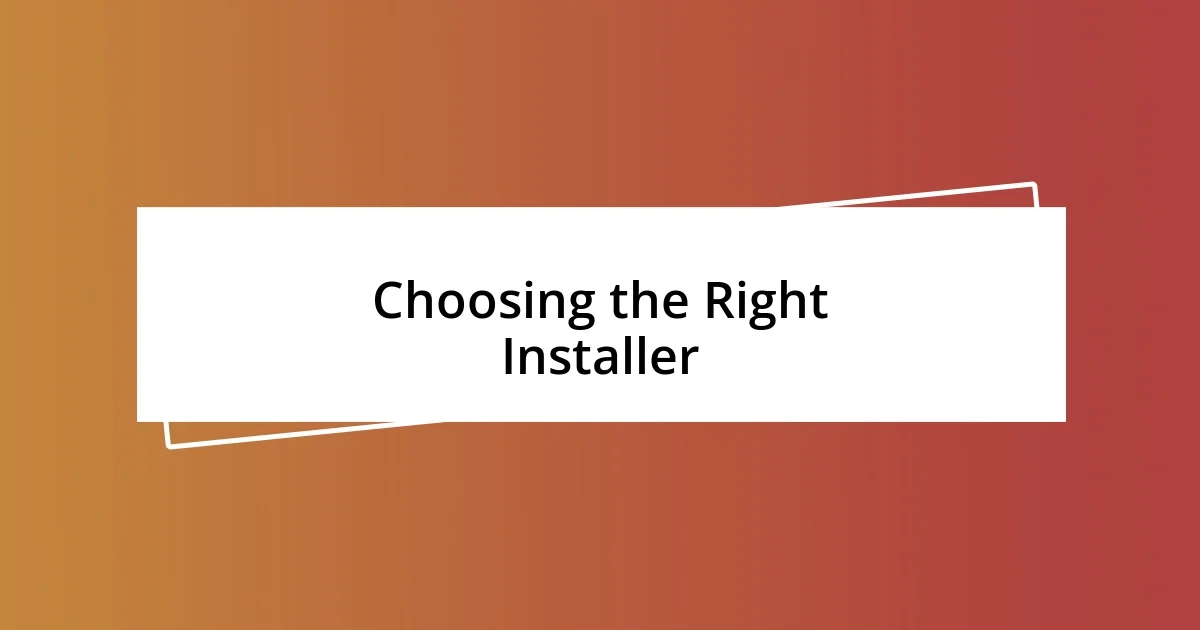
Choosing the Right Installer
Choosing the right installer for solar panels is a pivotal step that can either make or break your solar journey. Initially, I was overwhelmed by the choices available. I remember spending hours scrolling through reviews and testimonials, trying to find a contractor who combined expertise, positive feedback, and fair pricing. It became imperative for me to look beyond surface-level ratings; I sought out installers who had strong community ties and a proven track record of successful installations.
In my search, I learned the importance of asking the right questions. I decided to interview potential installers directly, which turned out to be quite enlightening. I asked about their experience with local climate conditions and their willingness to customize solutions for my specific needs. Connecting with them on a personal level revealed their passion for renewable energy and how much they cared about their clients. Their eagerness to share insights genuinely reassured me that I was making the right choice.
Ultimately, consider the installer’s certifications and warranties offered. It’s not just about the installation—it’s about the long-term reliability of the service. In hindsight, choosing an installer who could back their work not only protected my investment but also gave me peace of mind. Reflecting on this process, I feel empowered knowing that I took the time to find the right partner in my solar journey.
| Criteria | What to Look For |
|---|---|
| Experience | Years in the business and local knowledge |
| Reviews | Positive testimonials from previous customers |
| Certifications | Industry-standard certifications and training |
| Warranties | Comprehensive warranties for products and labor |
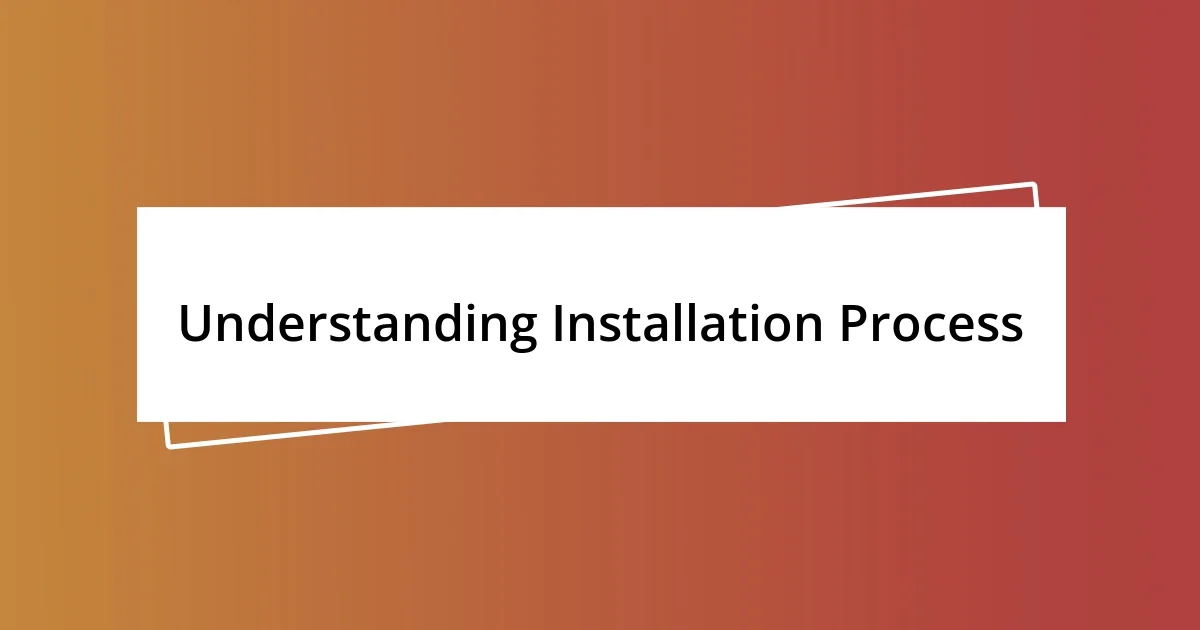
Understanding Installation Process
Understanding the installation process of solar panels can feel complex, but I found it fascinating once I started breaking it down. After settling on an installer, the first step involved a site assessment, which was a mix of excitement and anticipation for me. The technician arrived, ladder in hand, and started examining my roof’s orientation and shading. I couldn’t help but wonder how these details would influence the energy output. It was an eye-opener to see how every tiny factor can play a crucial role.
Next came the actual installation day, which felt like a milestone in my solar journey. Watching the crew carefully lay out the panels was thrilling! They explained each step as they worked, from mounting brackets to electrical connections. I felt a sense of camaraderie as they shared their tips and tricks, turning the technical process into a friendly collaboration. I remember asking, “How do you ensure everything stays safe?” Their confidence in explaining the safety measures instantly calmed my nerves and reaffirmed my decision.
Once everything was in place, and all that was left was the final inspection and connection to the grid—my heart raced with the thought of harnessing solar energy. The sense of achievement washed over me as the technician flipped the switch. It struck me how experiencing this process firsthand enriched my understanding and appreciation for solar energy. I realized that each step—no matter how small—was significant in creating a sustainable future. Have you ever felt that same excitement in taking control of your energy choices? It’s a journey worth embarking on!
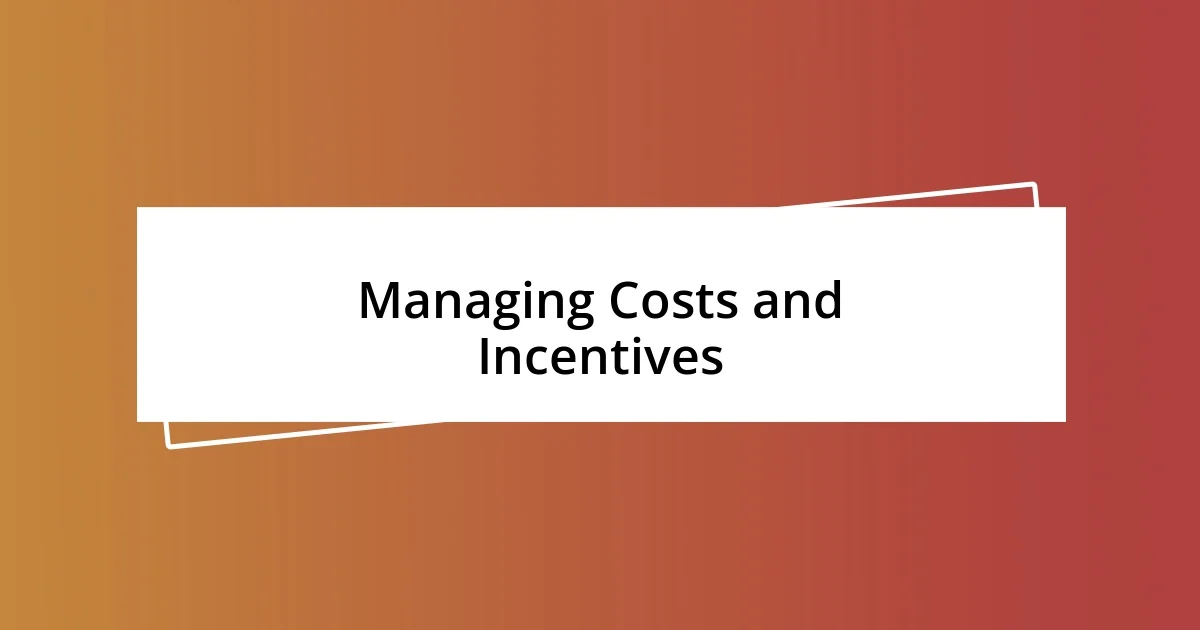
Managing Costs and Incentives
Managing the costs associated with solar panel installation can initially seem daunting. I remember my own struggle with budgeting—one moment I was excitedly calculating potential savings on my utility bills, and the next, I was faced with the upfront costs of the installation. It helped to break down the expenses into categories: equipment, labor, and permits. This not only clarified where my money was going but also made it easier to identify areas for potential savings, like opting for more efficient technology that pays off in the long run.
Diving into incentives was a game-changer for me. I discovered federal tax credits and state incentives that significantly reduced my overall investment. For instance, I was pleasantly surprised to find out that I could claim a portion of the installation costs back when tax season rolled around. Have you explored the incentives available in your area? I urge you to check, as I found that saving thousands of dollars was possible simply by doing a bit of research and staying informed.
Additionally, I recommend consulting with your installer about financing options. I learned that many installers offer payment plans that can fit different budgets. By spreading out the costs over time, I eased my financial burden and felt more comfortable making the switch to solar energy. Reflecting on this aspect of my journey, I realize that taking these steps not only made solar feasible but also empowered me to take control of my energy future. Each small effort to understand and manage costs truly paid off.
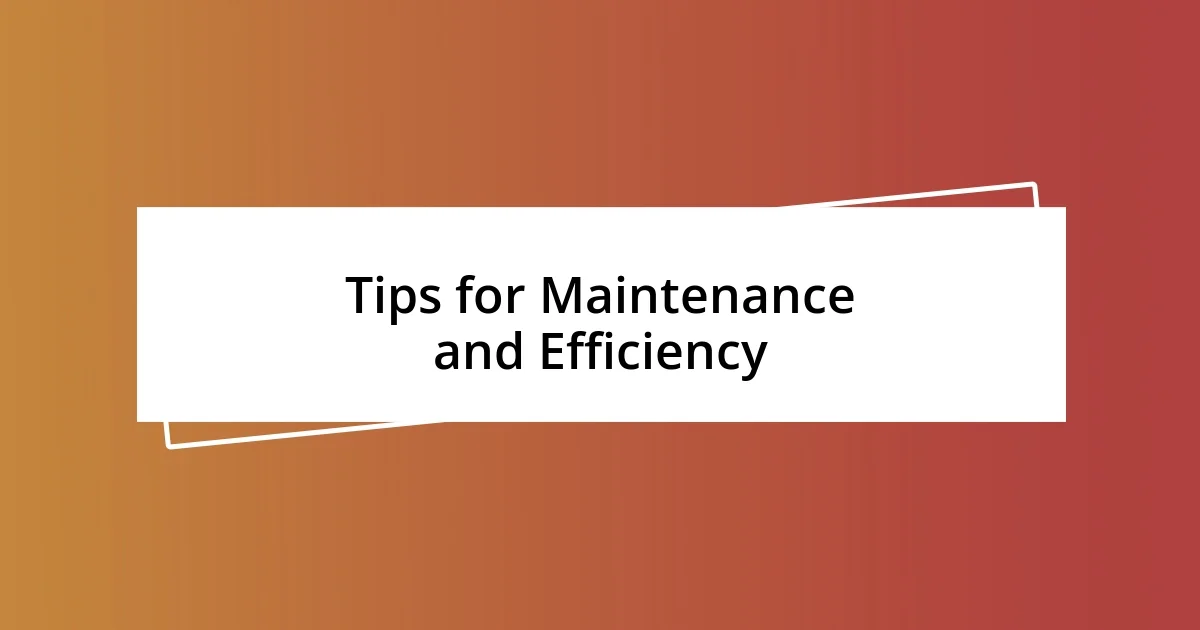
Tips for Maintenance and Efficiency
To maintain efficiency, regular inspection of your solar panels is essential. I remember the first time I climbed up to check on my panels, looking for dirt or debris obstructing sunlight. It’s surprising how dust can accumulate, especially after a storm or dry season. After a quick rinse with a hose, I noticed a remarkable jump in energy production. Have you ever experienced that boost after a little bit of TLC? It’s rewarding to see the immediate impact of maintenance.
Cleaning isn’t the only part of upkeep; inverter checks are crucial too. Early on, I learned that my inverter, which converts the solar energy, needed attention at least twice a year. I often found myself comparing it to regular car maintenance; you wouldn’t ignore your engine, right? An alert on my app once notified me of a drop in performance that led me to a quick fix. This proactive approach helped me avoid bigger issues down the road, and it felt empowering to be engaged in the process.
Another tip I wish I had learned sooner is the importance of shade management. I noticed some trees began to cast shadows across my panels as they grew. After a thoughtful conversation with my neighbor—which involved a lot of shared coffee—I encouraged him to trim back those branches. Not only did it enhance my solar efficiency, but it also fostered a sense of community. When are we going to start prioritizing our energy sources together? Small actions like this can lead to significant benefits for everyone involved, and believe me, the energy bill savings are worth the effort!












